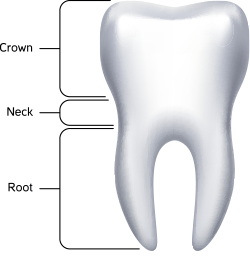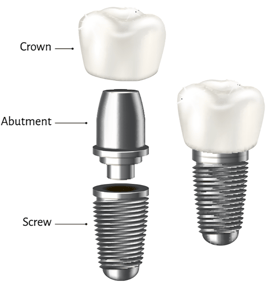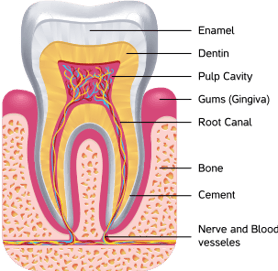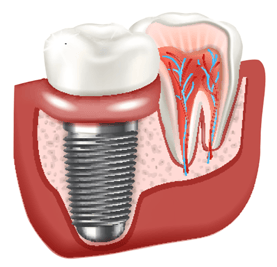First, it’s important to understand that no tooth replacement technique is as strong as natural teeth, so you want to keep your natural teeth as healthy as possible for as long as possible. However, in the course of a lifetime, most people will lose at least one tooth. Among the alternatives for dental restoration, dental implants are considerably stronger than bridges and dentures.
Comparative Strength of Different Types of Teeth

That’s because dental implants are the only form of dental restoration that is embedded in the jaw bone and support the continuous growth of bone. Let’s take a deeper look at how dental implants are structured for strength.
The Three Layer Structure of Teeth and Dental Implants
Natural Tooth Dental Implant


Dental implants mimic natural teeth in terms of their structural layers. Each natural tooth comprises three layers: the crown — the part of the tooth above the gum line; the neck — the part of the tooth that connects the surface layer to the root; and the root — the part of the tooth underneath the skin that connects the tooth to your jawbone.
Similarly, dental implants have three layers: the crown — the part of the tooth above the gum line; the abutment — which is just below the gum line and serves as a post to connect the crown with the screw; and the screw — which replaces the root and is embedded directly into the jawbone.
In natural teeth, the root does two things. The first is to support the healthy exchange of nutrients through blood vessels and nerves in the tooth's center (pulp center) and down through the root. The second is stabilizing the tooth by embedding the root into the bone and securing the connection via ligaments (periodontal ligaments). This gives teeth strength and a little suspension system that allows them to move minutely when chewing.
Natural Tooth Dental Implant
. 

Dental implants have no living cells, so the screw is implanted directly into the bone. This makes a dental implant immovable and strong. That’s also why strong bone is critical to the success of dental implants – you need adequate bone for embedding the screw, ensuring that bone integrates with the implant, and locking the implant in securely. As a result, dental implants are more durable and can withstand the millions of times you apply force to your teeth from biting and chewing.
Natural Tooth Crowns Versus Dental Implant Crowns
The crown of a natural tooth is covered with enamel. Enamel is mainly made of calcium phosphate, which is as hard as a rock and is one of the few substances in the body with no living cells. That means that tooth enamel won’t repair itself if it is damaged. Unfortunately, the enamel is also susceptible to tooth decay and cavities from the bacteria that live in the mouth and comes from food. That’s why good oral hygiene is so important every day – to prevent decay that can permanently destroy tooth enamel.
Dental implants are composed of ceramic crowns and titanium, which do not react to the bacteria in the mouth and, therefore, do not decay. That makes dental implant crowns more dependable and secure over time than enamel crowns.
Titanium – The Metal of Choice for Strong Dental Implants
Most dental implants today are made of titanium – a metal that is both strong and lightweight and can stand up to the force used to bite and chew. Titanium is ideal for medical and dental uses because it is biologically inert, which means it doesn’t react to human body fluids, is non-corrosive (it won’t rust), and doesn’t deteriorate in the body. It rarely causes any skin or tissue reaction.
Unlike most other metals, titanium binds to bone and living tissue, which means that, much like natural teeth, titanium enables bone to integrate and grow around the screw, making the implants more secure. It is also non-magnetic so it won’t set off metal detectors like those at airports.
Why Do Dental Implants Fail?
It’s exciting to get a dental implant. After a few months or so, your mouth may feel normal, but it takes at least 18 months for the bone to become strong enough to eat harder, chewier foods, so you want to be a little careful about what you eat a long time after getting your implant.
Now, while the vast majority of dental implants stay healthy for decades, sometimes dental implants do fail. This is usually caused by:
- An injury to the tooth, such as a fracture. Dental implants don’t promote growth in the protective periodontal ligaments that act as shock absorbers for natural teeth. As a result, repetitive stress on the tooth, like eating lots of nuts, leads to bone loss. The best way to prevent this type of injury is to avoid hard, crunchy foods or eat them in moderation.
- Poor mouth hygiene is often a culprit in failed dental implants. In a normal mouth, there are nine different types of gingival fibers to connect the gum tissue around the tooth firmly to the tooth. With dental implants, there are only at most two types of gingival fibers, so it is easier for bacteria and debris to collect near the implant and cause peri-implantitis, a gum infection. The best way to prevent this is with good home care, by regularly brushing and flossing at least twice a day and visiting your dentist for checkups at least twice a year.
- Sometimes other conditions may affect your teeth, such as osteoporosis, diabetes, or osteoarthritis. That’s why it is important to see your dentist for a regular check-up and x-rays — at least once a year — to make sure surrounding teeth aren’t being damaged or negatively impacting your bite or dental implants.
Dental Implants: The Best Choice for Replacing Teeth
Dental implants are designed to function as well as natural teeth and be permanent and long-lasting. Unlike dentures or bridges, they keep the bone tissue healthy and growing so that there is no additional bone deterioration or tooth loss and your facial structure remains sound. With good home care and routine dental checkups, dental implants are the best choice to replace your teeth. If you have any questions about dental implants, you can ask a dental implant expert, and find an implant dentist near you.




